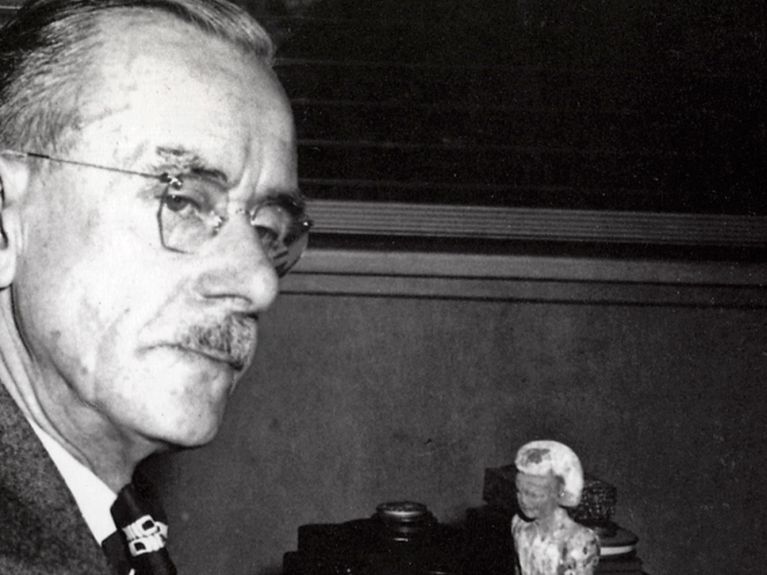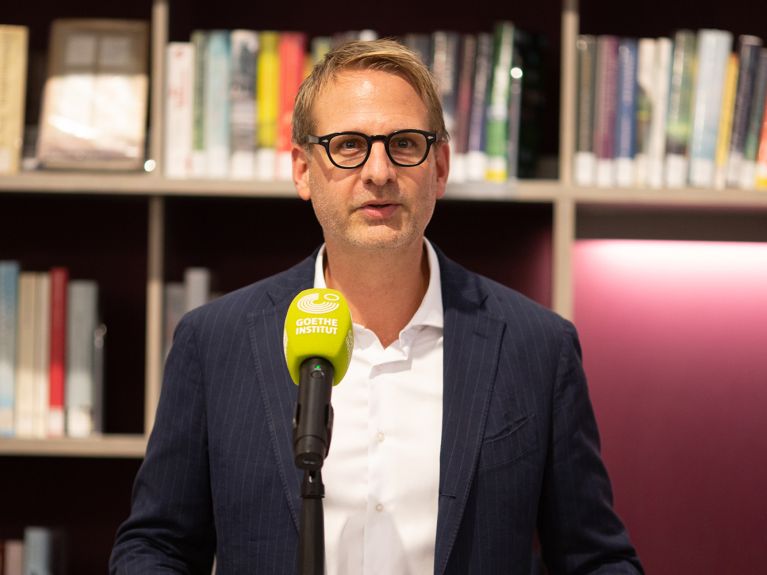“Democracy Will Win”
What is the responsibility of artists and intellectuals? What impact can individuals have? New views of Thomas Mann in New York.

“Democracy Will Win”: this Thomas Mann quote dates back to his time in exile, when the German winner of the Nobel Prize in Literature was forced by the Nazis to leave the country. Mann lived in the USA from 1938 until 1952, where he was a vociferous opponent of the Nazi dictatorship in Germany until the end of the war in 1945, as well as a general champion of democratic values. “Not ‘America First’ but ‘Democracy First’ and ‘Human Dignity First’ is the slogan which will really lead America to first place in the world”, is how a US newspaper cited the author in 1941, for instance. The exhibition “Thomas Mann: Democracy Will Win!” premiered at Munich’s Literaturhaus in 2020. In the autumn of 2021, the Goethe-Institut New York is presenting an adapted version for American audiences. In our interview, the institute’s director Jörg Schumacher talks about the exhibition, its supporting program and the cooperation with the Thomas Mann House and with the Villa Aurora in California.

Mr. Schumacher, what does Thomas Mann still have to say to us today?
This question is central to the exhibition “Democracy Will Win”. It sheds light on the political and artistic biography of Thomas Mann, who only became a champion of democracy during the course of his life. However, the exhibition also asks: What defines a political person nowadays? What significance does Thomas Mann’s path have for us in the present day? I have the impression that his statement “Democracy Will Win” will arouse particular interest, not least among younger audiences in the US.
Dieses YouTube-Video kann in einem neuen Tab abgespielt werden
YouTube öffnenThird party content
We use YouTube to embed content that may collect data about your activity. Please review the details and accept the service to see this content.
Open consent formWhat can we expect from the exhibition?
On the one hand, photographs and documents give us insights into the life and work of Thomas Mann; there is even a partial reproduction of his house in Pacific Palisades. This is reflected at the same time in the exhibition by quotes and videos of political personalities from both the more recent past and the present. These various ways of providing context range right up to the year 2021. Greta Thunberg and the Fridays for Future movement are quoted, as is for example the pianist Igor Levit, who fights among other things against right-wing extremism and anti-Semitism. Such different US presidents as John F. Kennedy, Barack Obama and Donald Trump are also addressed in the exhibition.
The exhibition’s supporting program includes a discussion and presentation of the book “Die Stadt nach Corona” (i.e. The City after Corona) by German architecture critics Doris Kleilein and Friederike Meyer. Why is this subject important to you?
One of the questions that interests us is which places democracy requires. Just recently, in mid-October, we brought architecture professor Jesse LeCavalier from Cornell University and German author Niklas Maak together in a panel discussion entitled “Where’s My Data?”. This focused among other things on Maak’s latest book “Servermanifest” (i.e. Server Manifesto), which reveals how little we know about server farms, despite the central role they play in the internet and exchange between people. Doris Kleilein and Friederike Meyer ask about the meaning and future prospects of the public sphere under the influence of a pandemic. At our event, they will be engaging in discussion with Mariana Mogilevich, editor-in-chief of Urban Omnibus, the online publication of the Architectural League of New York. The political value of public spaces also has a special significance for the Architectural League.
The Thomas Mann House and the Villa Aurora are partners of the exhibition “Democracy Will Win”. Why?
We complement one another wonderfully. None of us would have been able to create such a comprehensive exhibition and supporting program on our own. Some of the experts in the supporting program for “Democracy Will Win” were for example guests of the Thomas Mann House’s residency program in Pacific Palisades. In its turn, the Goethe-Institut is now providing a stage in Manhattan. That is a very good combination.



